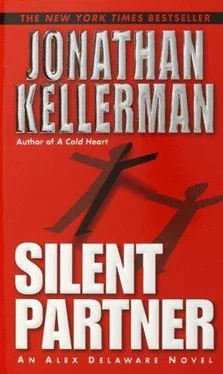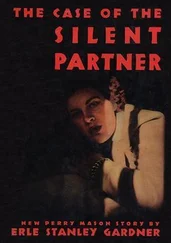Jonathan Kellerman - Silent Partner
Здесь есть возможность читать онлайн «Jonathan Kellerman - Silent Partner» весь текст электронной книги совершенно бесплатно (целиком полную версию без сокращений). В некоторых случаях можно слушать аудио, скачать через торрент в формате fb2 и присутствует краткое содержание. Жанр: Триллер, на английском языке. Описание произведения, (предисловие) а так же отзывы посетителей доступны на портале библиотеки ЛибКат.
- Название:Silent Partner
- Автор:
- Жанр:
- Год:неизвестен
- ISBN:нет данных
- Рейтинг книги:5 / 5. Голосов: 1
-
Избранное:Добавить в избранное
- Отзывы:
-
Ваша оценка:
- 100
- 1
- 2
- 3
- 4
- 5
Silent Partner: краткое содержание, описание и аннотация
Предлагаем к чтению аннотацию, описание, краткое содержание или предисловие (зависит от того, что написал сам автор книги «Silent Partner»). Если вы не нашли необходимую информацию о книге — напишите в комментариях, мы постараемся отыскать её.
Silent Partner — читать онлайн бесплатно полную книгу (весь текст) целиком
Ниже представлен текст книги, разбитый по страницам. Система сохранения места последней прочитанной страницы, позволяет с удобством читать онлайн бесплатно книгу «Silent Partner», без необходимости каждый раз заново искать на чём Вы остановились. Поставьте закладку, и сможете в любой момент перейти на страницу, на которой закончили чтение.
Интервал:
Закладка:
When I presented my report he moved to the edge of his chair. When I finished he was the first to speak. The other lawyers deferred to him. Like any wolf pack, they’d chosen their lead killer and were content to sit back and let him open the first wounds.
He reminded me that I was legally bound to tell the truth, just as if I were in court, that I was testifying under penalty of perjury. Then he removed a phone-book-thick pile of photocopied articles from his briefcase and made a show of stacking the papers on the table, shuffling and sorting and squaring off the corners. Lifting the top article, he said, “I’d like to read you something, Doctor.”
“Sure.”
He smiled. “I really wasn’t asking permission, Doctor.”
“I really wasn’t granting it.”
The smile disappeared. Mal nudged me under the table. Someone coughed. Moretti tried staring me down, then put on a pair of rimless octagonal glasses, cleared his throat, and began to read. He finished a paragraph before turning to me. “Familiar, Doctor?”
“Yes.”
“Do you remember the source?”
“It’s the introduction to an article I published in The Journal of Pediatrics in 1981. Summer of ’81, I believe. August.”
He examined the date but didn’t comment on it. “Do you remember the gist of that article, Doctor?”
“Yes.”
“Could you summarize it for us?”
“The article describes a study I did from 1977 through 1980, when I was at Western Pediatric Hospital. The research was funded by the National Institute of Mental Health and was designed to learn the effects of chronic disease upon the psychological adjustment of children.”
“Was it a well-designed study, Doctor?”
“I believe so.”
“You believe so. Tell us what you did in this well-designed study- be specific about your methodology.”
“I administered several tests of psychological adjustment to a sample of sick children and a control group of healthy children. The groups were matched in terms of social class, parental marital status, and family size. There was no significant difference between the groups.”
“No significant difference on any measure of psychological adjustment?”
“That’s correct.”
Moretti looked over at the legal reporter. “He talks fast. Do you have that down?”
She nodded.
Back to me: “For the sake of those of us who aren’t familiar with psychological jargon, specify what no significant difference means.”
“The groups were statistically indistinguishable. The average scores on these measures were similar.”
“Average?”
“Median- the fifty percent mark. Mathematically, it’s the best measure of typicality.”
“Yes, of course, but what does all of that mean ?”
“Chronically ill children may develop some problems but being sick doesn’t inevitably make them neurotic or psychotic.”
“Hold on for a moment,” said Moretti, patting the stack of papers. “I don’t see mention of any problems here, Doctor. Your basic finding was that the sick children were normal.”
“That’s true. However-”
“You spell it out right here, Doctor.” He held up the article, flipped a page, and jabbed his finger at it. “Right here in Table Three. ‘Spielberger State Anxiety scores, Rosenberg self-esteem scores, Achenbach Adjustment scores were all’- and I’m quoting verbatim-‘ within normal limits .’ Put in simple English, these kids were no more nervous or insecure or maladjusted or neurotic than their healthy peers, were they, Doctor?”
“This is starting to sound argumentative,” said Mal. “We’re here to find facts.”
“Quasi-facts, at best,” said Moretti. “This is psychology, not science.”
“ You quoted the article, Counselor,” said Mal.
“Your witness’s report seems to be contradicting his own published work, Counselor.”
“Would you like me to answer your question?” I asked Moretti.
He removed his glasses, sat back, and gave a quarter-smile. “If you can.”
“Read the discussion section,” I said. “The last three paragraphs specifically. I list several problem areas chronically ill children have to deal with throughout their lives- pain and discomfort, disruption of school due to treatment and hospitalization, body changes brought about by both disease and treatment, social rejection, overprotectiveness by parents. In general, children cope well with these problems, but problems still exist.”
“The discussion section,” said Moretti. “Aha. The place researchers dump their conjectures. But your own data - your statistics say otherwise. Really, Doctor-”
“In other words,” Mal broke in, turning to me, “what you’re saying, Dr. Delaware, is that sick children and traumatized children face a constant flood of challenges- life is agonizing for them- but some are able to handle it.”
“Yes.”
Mal swept his eyes up and down the table, avoiding Moretti, establishing momentary eye contact with each of the other lawyers. “No reason to penalize a child for coping well, is there, gentlemen?”
“Who’s the witness here?” snapped Moretti, waving the reprint.
“No reason to penalize a child for dealing with his trauma,” said Mal.
“ Trauma? ” said Moretti. “There’s nothing in this article about traumatized children ,” said Moretti. “These are chronically ill kids- chronic , as in long-term. Darren Burkhalter is a one-shot deal. He has no ongoing pain or physical change to deal with. He’d be even less vulnerable to problems than someone chronically disabled.”
He allowed himself a full smile.
To him it was all a game. I thought of little boys engaging in back-alley pissing contests and said, “Good point, Mr. Moretti. Chronically ill and traumatized children are very different. That’s why I was wondering why you quoted from the article in the first place.”
A couple of the other lawyers smiled.
“Touché,” Mal whispered in my ear.
One of the other insurance lawyers was whispering in Moretti’s ear. The lead man wasn’t pleased with what he was hearing but he listened impassively, then put the reprint aside.
“All right, Doctor, let’s talk about the whole notion of early childhood trauma . Your conclusion, as I understand it, is that Darren Burkhalter will be scarred emotionally, for life, because of his presence during an automobile accident.”
“You understand wrong,” I said. Moretti reddened. Mal raised his eyebrows and gave a soft whistle.
“Now, Doctor-”
“What I did say, Mr. Moretti, was that during my examination of him, Darren Burkhalter exhibited classic symptoms of trauma for a child his age. Sleep problems, nightmares, phobias, aggressiveness, hyperactivity, tantrums, periods of increased clinginess. According to both his mother and his day-care teacher, he showed none of these behaviors prior to the accident. It’s reasonable to assume they were related to the accident- though I can’t prove that with hard data . Whether or not these problems will develop into chronic disabilities isn’t clear, although the risk is high if psychotherapy doesn’t continue. In addition, Darren is lagging in his speech and language development- his milestones are several months behind average. How much of that is due to the trauma is impossible to judge, but it’s well worth thinking about when considering this child’s future.”
“It certainly is impossible to judge,” said Moretti. “My reading of the literature in your field is that intelligence is primarily genetically determined. The best predictor of a child’s IQ is his father’s IQ- Katz, Dash, and Ellenberg, 1981.”
Читать дальшеИнтервал:
Закладка:
Похожие книги на «Silent Partner»
Представляем Вашему вниманию похожие книги на «Silent Partner» списком для выбора. Мы отобрали схожую по названию и смыслу литературу в надежде предоставить читателям больше вариантов отыскать новые, интересные, ещё непрочитанные произведения.
Обсуждение, отзывы о книге «Silent Partner» и просто собственные мнения читателей. Оставьте ваши комментарии, напишите, что Вы думаете о произведении, его смысле или главных героях. Укажите что конкретно понравилось, а что нет, и почему Вы так считаете.












